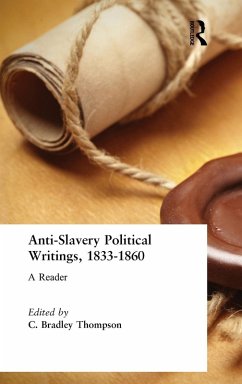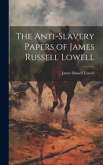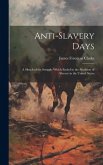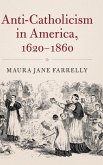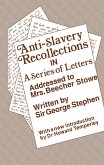- Gebundenes Buch
- Merkliste
- Auf die Merkliste
- Bewerten Bewerten
- Teilen
- Produkt teilen
- Produkterinnerung
- Produkterinnerung
The abolitionist movement in 19th century America led directly to the end of slavery in the United States. This collection of more than 20 original documents including speeches, editorials, books and fiction, captures the deep ideological divisions within the abolitionist movement.
Andere Kunden interessierten sich auch für
![The Anti-Slavery Cause in America and Its Martyrs The Anti-Slavery Cause in America and Its Martyrs]() Eliza WighamThe Anti-Slavery Cause in America and Its Martyrs32,99 €
Eliza WighamThe Anti-Slavery Cause in America and Its Martyrs32,99 €![The Anti-Slavery Papers of James Russell Lowell The Anti-Slavery Papers of James Russell Lowell]() James Russell LowellThe Anti-Slavery Papers of James Russell Lowell32,99 €
James Russell LowellThe Anti-Slavery Papers of James Russell Lowell32,99 €![Anti-slavery Days; a Sketch of the Struggle Which Ended in the Abolition of Slavery in the United States Anti-slavery Days; a Sketch of the Struggle Which Ended in the Abolition of Slavery in the United States]() James Freeman ClarkeAnti-slavery Days; a Sketch of the Struggle Which Ended in the Abolition of Slavery in the United States34,99 €
James Freeman ClarkeAnti-slavery Days; a Sketch of the Struggle Which Ended in the Abolition of Slavery in the United States34,99 €![Anti-Catholicism in America, 1620-1860 Anti-Catholicism in America, 1620-1860]() Maura Jane FarrellyAnti-Catholicism in America, 1620-186097,99 €
Maura Jane FarrellyAnti-Catholicism in America, 1620-186097,99 €![The Anti-slavery Papers Of James Russell Lowell; Volume 1 The Anti-slavery Papers Of James Russell Lowell; Volume 1]() James Russell LowellThe Anti-slavery Papers Of James Russell Lowell; Volume 134,99 €
James Russell LowellThe Anti-slavery Papers Of James Russell Lowell; Volume 134,99 €![Anti-Slavery Recollection CB Anti-Slavery Recollection CB]() George StephenAnti-Slavery Recollection CB180,99 €
George StephenAnti-Slavery Recollection CB180,99 €![A Review of the Political Conflict in America, From the Commencement of the Anti-slavery Agitation to the Close of Southern Reconstruction; Comprising A Review of the Political Conflict in America, From the Commencement of the Anti-slavery Agitation to the Close of Southern Reconstruction; Comprising]() Alexander HarrisA Review of the Political Conflict in America, From the Commencement of the Anti-slavery Agitation to the Close of Southern Reconstruction; Comprising40,99 €
Alexander HarrisA Review of the Political Conflict in America, From the Commencement of the Anti-slavery Agitation to the Close of Southern Reconstruction; Comprising40,99 €-
-
-
The abolitionist movement in 19th century America led directly to the end of slavery in the United States. This collection of more than 20 original documents including speeches, editorials, books and fiction, captures the deep ideological divisions within the abolitionist movement.
Hinweis: Dieser Artikel kann nur an eine deutsche Lieferadresse ausgeliefert werden.
Hinweis: Dieser Artikel kann nur an eine deutsche Lieferadresse ausgeliefert werden.
Produktdetails
- Produktdetails
- Verlag: Taylor & Francis
- Seitenzahl: 320
- Erscheinungstermin: 30. September 2003
- Englisch
- Abmessung: 235mm x 161mm x 27mm
- Gewicht: 603g
- ISBN-13: 9780765604026
- ISBN-10: 0765604027
- Artikelnr.: 21007083
- Herstellerkennzeichnung
- Libri GmbH
- Europaallee 1
- 36244 Bad Hersfeld
- gpsr@libri.de
- Verlag: Taylor & Francis
- Seitenzahl: 320
- Erscheinungstermin: 30. September 2003
- Englisch
- Abmessung: 235mm x 161mm x 27mm
- Gewicht: 603g
- ISBN-13: 9780765604026
- ISBN-10: 0765604027
- Artikelnr.: 21007083
- Herstellerkennzeichnung
- Libri GmbH
- Europaallee 1
- 36244 Bad Hersfeld
- gpsr@libri.de
C. Bradley Thompsom
Part 1 Slavery and Freedom; Chapter 1 The Patriarchal Institution
as Described by Members of Its Own Family (1860)
Lydia Maria Child; Chapter 2 "Lecture on Slavery
No. 1" (1850)
Frederick Douglass; Chapter 3 Selections from Slavery (1836)
William E. Channing; Part 2 Immediate Emancipation; Chapter 4 "Declaration of Sentiments of the National Anti-Slavery Convention" (1833)
William Lloyd Garrison; Chapter 5 Selections from Lectures on Slavery and its Remedy (1834)
Amos A. Phelps; Part 3 Moral Suasion and Politics; Chapter 6 "An Address to the Abolitionists of Massachusetts
on the Subject of Political Action" (1838); Chapter 7 "A Letter on the Political Obligation of Abolitionists
with a Reply by William Lloyd Garrison" (1839)
James G. Birney; Chapter 8 "Talk About Political Party" (1842)
Lydia Maria Child; Part 4 The Liberty Party; Chapter 9 "Lecture Showing the Necessity for a Liberty Party
and Setting Forth Its Principles
Measures
and Object" (1844)
Arnold Buffum; Chapter 10 "Address of the Macedon Convention" (1847)
William Goodell; Part 5 Slavery and the Constitution; Chapter 11 Slavery and the Constitution (1849)
William I. Bowditch; Chapter 12 "The Constitution of the United States: Is It Pro-Slavery or Anti-Slavery?" (1860)
Frederick Douglass; Part 6 Free-Soil and Fugitive Slaves; Chapter 13 "The Two Altars; Or
Two Pictures in One" (1851)
Harriet Beecher Stowe; Chapter 14 "Speech on Our Present Anti-Slavery Duties" (1850)
Charles Sumner; Part 7 Impending Crisis; Chapter 15 "Moral Responsibility of Statesmen" (1854)
Joshua R. Giddings; Chapter 16 "What Is My Duty as an Anti-Slavery Voter?" and "Fremont and Dayton" (1856)
Frederick Douglass; Chapter 17 "House Divided": Speech at Springfield
Illinois (1858)
Abraham Lincoln; Part 8; Chapter 18 "Address to the Slaves of the United States of America" (1843)
Henry Highland Garnet; Chapter 19 "No Compromise With Slavery" (1854)
William Lloyd Garrison; Chapter 20 "No Rights
No Duties: Or
Slaveholders
as Such
Have No Rights; Slaves
as Such
Owe No Duties" (1860)
Henry C. Wright; Chapter 21 A Plan for the Abolition of Slavery (1858)
Lysander Spooner;
as Described by Members of Its Own Family (1860)
Lydia Maria Child; Chapter 2 "Lecture on Slavery
No. 1" (1850)
Frederick Douglass; Chapter 3 Selections from Slavery (1836)
William E. Channing; Part 2 Immediate Emancipation; Chapter 4 "Declaration of Sentiments of the National Anti-Slavery Convention" (1833)
William Lloyd Garrison; Chapter 5 Selections from Lectures on Slavery and its Remedy (1834)
Amos A. Phelps; Part 3 Moral Suasion and Politics; Chapter 6 "An Address to the Abolitionists of Massachusetts
on the Subject of Political Action" (1838); Chapter 7 "A Letter on the Political Obligation of Abolitionists
with a Reply by William Lloyd Garrison" (1839)
James G. Birney; Chapter 8 "Talk About Political Party" (1842)
Lydia Maria Child; Part 4 The Liberty Party; Chapter 9 "Lecture Showing the Necessity for a Liberty Party
and Setting Forth Its Principles
Measures
and Object" (1844)
Arnold Buffum; Chapter 10 "Address of the Macedon Convention" (1847)
William Goodell; Part 5 Slavery and the Constitution; Chapter 11 Slavery and the Constitution (1849)
William I. Bowditch; Chapter 12 "The Constitution of the United States: Is It Pro-Slavery or Anti-Slavery?" (1860)
Frederick Douglass; Part 6 Free-Soil and Fugitive Slaves; Chapter 13 "The Two Altars; Or
Two Pictures in One" (1851)
Harriet Beecher Stowe; Chapter 14 "Speech on Our Present Anti-Slavery Duties" (1850)
Charles Sumner; Part 7 Impending Crisis; Chapter 15 "Moral Responsibility of Statesmen" (1854)
Joshua R. Giddings; Chapter 16 "What Is My Duty as an Anti-Slavery Voter?" and "Fremont and Dayton" (1856)
Frederick Douglass; Chapter 17 "House Divided": Speech at Springfield
Illinois (1858)
Abraham Lincoln; Part 8; Chapter 18 "Address to the Slaves of the United States of America" (1843)
Henry Highland Garnet; Chapter 19 "No Compromise With Slavery" (1854)
William Lloyd Garrison; Chapter 20 "No Rights
No Duties: Or
Slaveholders
as Such
Have No Rights; Slaves
as Such
Owe No Duties" (1860)
Henry C. Wright; Chapter 21 A Plan for the Abolition of Slavery (1858)
Lysander Spooner;
Part 1 Slavery and Freedom; Chapter 1 The Patriarchal Institution
as Described by Members of Its Own Family (1860)
Lydia Maria Child; Chapter 2 "Lecture on Slavery
No. 1" (1850)
Frederick Douglass; Chapter 3 Selections from Slavery (1836)
William E. Channing; Part 2 Immediate Emancipation; Chapter 4 "Declaration of Sentiments of the National Anti-Slavery Convention" (1833)
William Lloyd Garrison; Chapter 5 Selections from Lectures on Slavery and its Remedy (1834)
Amos A. Phelps; Part 3 Moral Suasion and Politics; Chapter 6 "An Address to the Abolitionists of Massachusetts
on the Subject of Political Action" (1838); Chapter 7 "A Letter on the Political Obligation of Abolitionists
with a Reply by William Lloyd Garrison" (1839)
James G. Birney; Chapter 8 "Talk About Political Party" (1842)
Lydia Maria Child; Part 4 The Liberty Party; Chapter 9 "Lecture Showing the Necessity for a Liberty Party
and Setting Forth Its Principles
Measures
and Object" (1844)
Arnold Buffum; Chapter 10 "Address of the Macedon Convention" (1847)
William Goodell; Part 5 Slavery and the Constitution; Chapter 11 Slavery and the Constitution (1849)
William I. Bowditch; Chapter 12 "The Constitution of the United States: Is It Pro-Slavery or Anti-Slavery?" (1860)
Frederick Douglass; Part 6 Free-Soil and Fugitive Slaves; Chapter 13 "The Two Altars; Or
Two Pictures in One" (1851)
Harriet Beecher Stowe; Chapter 14 "Speech on Our Present Anti-Slavery Duties" (1850)
Charles Sumner; Part 7 Impending Crisis; Chapter 15 "Moral Responsibility of Statesmen" (1854)
Joshua R. Giddings; Chapter 16 "What Is My Duty as an Anti-Slavery Voter?" and "Fremont and Dayton" (1856)
Frederick Douglass; Chapter 17 "House Divided": Speech at Springfield
Illinois (1858)
Abraham Lincoln; Part 8; Chapter 18 "Address to the Slaves of the United States of America" (1843)
Henry Highland Garnet; Chapter 19 "No Compromise With Slavery" (1854)
William Lloyd Garrison; Chapter 20 "No Rights
No Duties: Or
Slaveholders
as Such
Have No Rights; Slaves
as Such
Owe No Duties" (1860)
Henry C. Wright; Chapter 21 A Plan for the Abolition of Slavery (1858)
Lysander Spooner;
as Described by Members of Its Own Family (1860)
Lydia Maria Child; Chapter 2 "Lecture on Slavery
No. 1" (1850)
Frederick Douglass; Chapter 3 Selections from Slavery (1836)
William E. Channing; Part 2 Immediate Emancipation; Chapter 4 "Declaration of Sentiments of the National Anti-Slavery Convention" (1833)
William Lloyd Garrison; Chapter 5 Selections from Lectures on Slavery and its Remedy (1834)
Amos A. Phelps; Part 3 Moral Suasion and Politics; Chapter 6 "An Address to the Abolitionists of Massachusetts
on the Subject of Political Action" (1838); Chapter 7 "A Letter on the Political Obligation of Abolitionists
with a Reply by William Lloyd Garrison" (1839)
James G. Birney; Chapter 8 "Talk About Political Party" (1842)
Lydia Maria Child; Part 4 The Liberty Party; Chapter 9 "Lecture Showing the Necessity for a Liberty Party
and Setting Forth Its Principles
Measures
and Object" (1844)
Arnold Buffum; Chapter 10 "Address of the Macedon Convention" (1847)
William Goodell; Part 5 Slavery and the Constitution; Chapter 11 Slavery and the Constitution (1849)
William I. Bowditch; Chapter 12 "The Constitution of the United States: Is It Pro-Slavery or Anti-Slavery?" (1860)
Frederick Douglass; Part 6 Free-Soil and Fugitive Slaves; Chapter 13 "The Two Altars; Or
Two Pictures in One" (1851)
Harriet Beecher Stowe; Chapter 14 "Speech on Our Present Anti-Slavery Duties" (1850)
Charles Sumner; Part 7 Impending Crisis; Chapter 15 "Moral Responsibility of Statesmen" (1854)
Joshua R. Giddings; Chapter 16 "What Is My Duty as an Anti-Slavery Voter?" and "Fremont and Dayton" (1856)
Frederick Douglass; Chapter 17 "House Divided": Speech at Springfield
Illinois (1858)
Abraham Lincoln; Part 8; Chapter 18 "Address to the Slaves of the United States of America" (1843)
Henry Highland Garnet; Chapter 19 "No Compromise With Slavery" (1854)
William Lloyd Garrison; Chapter 20 "No Rights
No Duties: Or
Slaveholders
as Such
Have No Rights; Slaves
as Such
Owe No Duties" (1860)
Henry C. Wright; Chapter 21 A Plan for the Abolition of Slavery (1858)
Lysander Spooner;

